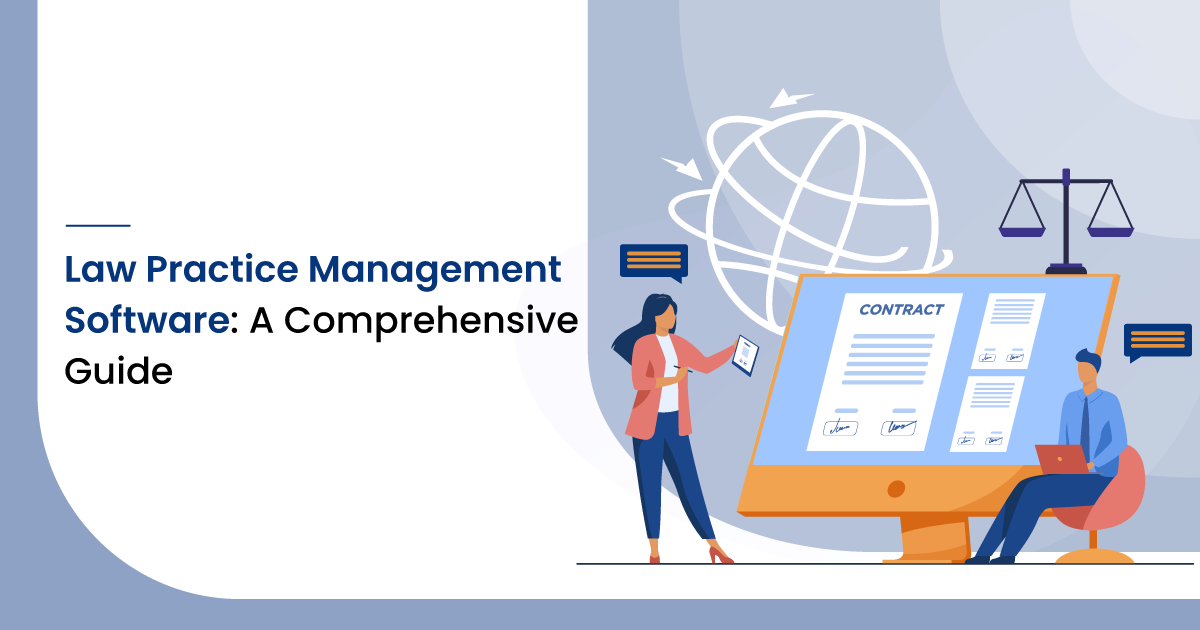Managing law practice is not easy. Lawyers, paralegals, and support staff may counter various challenges on a day-to-day basis to keep up all the parts aligned and moving. From an endless stream of emails to the drafting of legal, complex contracts, the legal profession seems to involve never-ending work.
Law practice management software turns out to be a perfect solution. Whether they use it or not, most legal professionals understand the benefits of using a practice management solution.
Wondering if a law practice management system can add value to your legal practice? Stick along as this article take you through the ins and outs of how law practice management software can help you reduce workplace stress and achieve a more streamlined workflow.
What is law practice management software?
Law practice management software is a program developed to help law firms manage their operations, including case & client records, bookkeeping, billing, schedules, appointments, and more. These solutions further help you comply with your local, state, and federal requirements, such as document retention policies and electronic filing systems.
Most law schools don’t generally equip new attorneys with the necessary business and management skills to run a law firm. Therefore, many offices have shifted to technology-based solutions to mitigate clerical errors and ease the learning curve. These solutions can yield long-term savings by improving efficiency, providing for conflict checking, and enabling a law firm to reduce the need for recurring, time-consuming tasks.
Features of a Law Practice Management System
A law practice system can make life in your office a bit easier. Different solutions offer different features, which cater to varying needs of law firms. However, each product boils down to the following features discussed below.
1. Client acquisition
The client acquisition or client intake feature is designed to make the process easier for both you and the clients. Your potential clients can complete the questionnaire without before coming to you for consultation. The information entered by the client is automatically transferred to your system can be reviewed before the appointment. This enables you to cut down the time spent in getting acquainted with your client and case as you’ll be having all the necessary information beforehand.
2. Contact and client management
This feature allows you to store and organize all the contact and client information in one place. Now, you don’t need to search through your emails and databases or rely on others for updated information. You can easily find and update information, along with seeing who created the contact and when it was created.
3. Matter and case management
Law practice management software provides information organized by case or matter (depending upon your preference). It helps you gather important law firm data about your client and their requirements. You can create a separate account for each client and break it down into different fragments based on information and data. Thus, you have to worry less about physical storage capacity as it would be easier to find what you need when required. With having all the client and case information in one centralized database, you can find all the necessary data if the client calls you with questions or queries.
4. Calendering
This feature helps you track your appointments with clients and opposing counsel. Most practice management software programs support integration with Outlook and Google calendars, which enables you to keep everyone within the law firm on the same page.
5. Document management
All modern-day law practice management software solutions allow digital storage of documents concerning cases, client matters, and the law firm. The system stores documents in the form of templates, PDF files, spreadsheets, word documents, photos, etc. Since all the information is kept in one place, the collaboration of documents becomes effortless. It also reduces the risk of losing relevant documents and photos, which can be critical to a case.
6. Docketing
Rules-Based Calendaring (RBC) or Docketing is a digital way of tracking legal hearings, filing deadlines, scheduling meetings, etc. With the help of this feature, law firms can get rid of the tedious procedure of calculating periods.
7. Billing & Accounting
The billing feature uses the time recorded to generate an electronic invoice, along with the due date for billing. This feature goes hand in hand with the accounting feature that enables you to create reports, track expenses, and understand the flow of money in and out of the organization.
Also, Read: Hassle-free Tips to Secure your Law Firm Data with Legal Software
Common Challenges Faced by Legal Professionals
As discussed before, law schools have done a great job teaching you law but failed pretty badly in educating you about running a small business. Here are a few common challenges readily faced by solo and small law firms.
1. Providing better client service
With the concept of online reputation management and online reviews on the rise, providing better service is more important than ever. The process of acquiring and retaining a client requires a different approach than it used to a decade ago. Now, you need to make your services stand out from other providers in your area by providing best-in-class service.
And great service is not just about planning your office or documents and signature, but the peace of mind your give to the client. However, law practitioners struggle with providing the right tools and resources for their clients to stay updated on their cases and provide better services.
2. Managing and growing a business
You find early success working as a solo, but in order to scale up, you would need to get overtime slips, paper notes, and spreadsheets to a more effective, automated system. Most lawyers struggle when they are transitioning from a solo service provider to a full-fledged law firm. As the firm gets bigger, the team size increases, and so does the data & paperwork and the need for storage.
Studies suggest that law firms affect tamper their productivity and efficiency by 40-50 percent by manually performing document management and communicating with clients. And to effectively manage and scale a business, you need to delegate these tasks and focus on core, more productive activities.
3. Collecting payments
Like any business, getting the clients to pay can be an obscuring task, especially when they are going through legal trouble. Maybe they are struggling financially, and as their lawyer, you are probably aware of their situation, which makes it more difficult for you to ask them to come to your office to pay or put a check in the mail. Traditional payment practices limit the cashflow. Law firms need to adopt online payment methods, which makes it easy for both them and their clients to manage the payments.
Benefits of Using a Law Practice Management Software
A robust, full-fledged law practice management system turns out to be a one-stop solution for all the challenges discussed above. Let’s take a look at some benefits of using a modern law practice management software program.
1. Improved team collaboration
Scheduling meetings with clients and partners can be tormenting, as you will need to keep up with everyone’s calendar and schedules. A legal software program eases the entire process by simply displaying the matter schedule and bringing all members on the same page.
2. Improved deadline management and file organization
The value of meeting deadlines is crucial for a legal professional, so much so that even a single lapse in deadline can affect the outcome of a case. Modern legal systems enable you to accommodate critical dates in your case management workflow to ensure you are always updated with your upcoming schedule. This software also allows you to effectively store, organize, and retrieve client documents, thus, enabling you to access any client information with ease.
3. Enhanced communication efficiency
The system provides all the contact information in one place, making it easier for you to find the desired contact. All you need to do is think of the client’s name, enter it in the database, and easily retrieve the communication information whenever you want. When organizing a case, you will need to fetch data from multiple sources – transcripts from the shelf, briefs from your server, and emails in your email system. Law practice management software enables you to access this information from a consolidated platform, thus, helping you save time and resources.
Also, Read: 11 Best Legal Document Management Software to Look Forward
4. Remote work capabilities
Most legal practice software programs entail online capabilities. Therefore, you can work on your client documents and cases anytime from anywhere. This feature can come in handy in situations like the current lockdown due to the COVID-19 outbreak.
5. Accurate billing
The life of a lawyer is busy, and the last thing you want to do is spend hours calculating time and creating bills. These systems do that for you on the go, which not only automates the process but prevents the loss of track of billable time.
Wrapping up
The namesake “tried and tested” methods for running your law firm worked well in the past, but now, you’ll need to keep up with the changing business environment and consumer preferences. Law practice management software is the need of the hour, as it offers improved efficiency, greater flexibility, enhanced data management, and centralized data sources.
Need Any Technology Assistance? Call Pursho @ 0731-6725516




